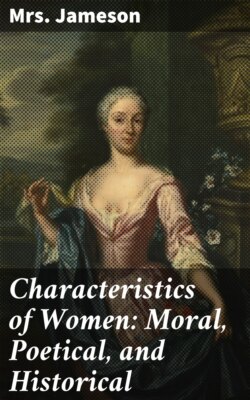Characteristics of Women: Moral, Poetical, and Historical

Реклама. ООО «ЛитРес», ИНН: 7719571260.
Оглавление
Mrs. (Anna) Jameson. Characteristics of Women: Moral, Poetical, and Historical
Characteristics of Women: Moral, Poetical, and Historical
Table of Contents
PREFACE
TO THE NEW EDITION
CHARACTERISTICS OF WOMEN
INTRODUCTION
Scene—A Library
FOOTNOTES:
CHARACTERS OF INTELLECT
PORTIA
ISABELLA
BEATRICE
ROSALIND
FOOTNOTES:
CHARACTERS OF PASSION AND IMAGINATION
JULIET
HELENA
PERDITA
VIOLA
OPHELIA
MIRANDA
FOOTNOTES:
CHARACTERS OF THE AFFECTIONS
HERMIONE
DESDEMONA
IMOGEN
CORDELIA
FOOTNOTES:
HISTORICAL CHARACTERS
CLEOPATRA
OCTAVIA
VOLUMNIA
CONSTANCE
QUEEN ELINOR
BLANCHE
MARGARET OF ANJOU
QUEEN KATHERINE OF ARRAGON
LADY MACBETH
FOOTNOTES:
Отрывок из книги
Mrs. Jameson
Published by Good Press, 2019
.....
Several critics have remarked in general terms on those beautiful pictures of female friendship, and of the generous affection of women for each other, which we find in Shakspeare. Other writers, especially dramatic writers, have found ample food for wit and satiric delineation in the littleness of feminine spite and rivalry, in the mean spirit of competition, the petty jealousy of superior charms, the mutual slander and mistrust, the transient leagues of folly or selfishness miscalled friendship—the result of an education which makes vanity the ruling principle, and of a false position in society. Shakspeare, who looked upon women with the spirit of humanity, wisdom, and deep love, has done justice to their natural good tendencies and kindly sympathies. In the friendship of Beatrice and Hero, of Rosalind and Celia; in the description of the girlish attachment of Helena and Hermia, he has represented truth and generous affection rising superior to all the usual sources of female rivalry and jealousy; and with such force and simplicity, and obvious self-conviction, that he absolutely forces the same conviction on us.
Add to these the generous feeling of Viola for her rival Olivia; of Julia for her rival Sylvia; of Helena for Diana; of the old Countess for Helena, in the same play; and even the affection of the wicked queen in Hamlet for the gentle Ophelia, which prove that Shakspeare thought—(and when did he ever think other than the truth?)—that women have by nature "virtues that are merciful," and can be just, tender, and true to their sister women, whatever wits and worldlings, and satirists and fashionable poets, may say or sing of us to the contrary. There is another thing which he has most deeply felt and beautifully represented—the distinction between masculine and feminine courage. A man's courage is often a mere animal quality, and in its most elevated form a point of honor. But a woman's courage is always a virtue, because it is not required of us, it is not one of the means through which we seek admiration and applause; on the contrary, we are courageous through our affections and mental energies, not through our vanity or our strength. A woman's heroism is always the excess of sensibility. Do you remember Lady Fanshawe putting on a sailor's jacket, and his "blue thrum cap," and standing at her husband's side, unknown to him during a sea-fight? There she stood, all bathed in tears, but fixed to that spot. Her husband's exclamation when he turned and discovered her—"Good God, that love should make such a change as this!" is applicable to all the acts of courage which we read or hear of in women. This is the courage of Juliet, when, after summing up all the possible consequences of her own act, till she almost maddens herself with terror, she drinks the sleeping potion; and for that passive fortitude which is founded in piety and pure strength of affection, such as the heroism of Lady Russel and Gertrude de Wart, he has given us some of the noblest modifications of it in Hermione, in Cordelia, in Imogen, in Katherine of Arragon.
.....